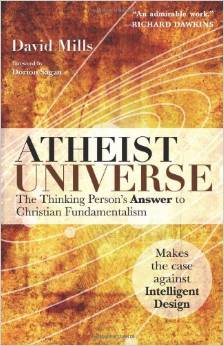
Atheist Universe
David Mills (Xlibris: Apr 6, 2004)In this work, essentially an update of Mills’s Atheist Universe: Why God Didn’t Have a Thing To Do with It (2004), he surveys a variety of topics, including intelligent design and the origin of the universe, as well as conducts what appears to be a mock interview with himself. While some of Mills’s arguments are logically sound, his antagonistic way of presenting them grows tiresome. For example, he avers that agnostics choose agnosticism over atheism primarily owing to a lack of “guts,” failing to support that assertion with anything other than his own opinion. In addition, he calls all Christian fundamentalists naive and suggests that all public schools are “miserable.” But perhaps his most egregious mischaracterization is his description of atheism as a positive philosophy. Most scholars would agree that atheism is not a philosophy, but a factual premise based on logical conjecture. In fact, atheism addresses only one question: does God exist? In light of the various philosophical worldviews — e.g., humanism, secular Judaism — by which atheists can choose to live their lives, Mills’s suggestion that atheism per se is a positive philosophy is unsubstantiated. Not recommended. ~ Brad S. Matthies, Butler University
Contents
Questions Addressed in Atheist Universe
- What, precisely, is atheism, and why is it misunderstood so thoroughly?
- If God is a myth, then did the universe appear from nothing?
- Does the meticulous clockwork of planetary motion result from mindless random forces?
- Do atheists believe that human beings evolved through blind accident from lifeless matter?
- Do the splendor and intricacy of life on Earth reveal evidence of intelligent design by a supernatural Creator?
- Can atheists prove that God does not exist?
- What about Creation Science, and the popular new movement to reconcile Scripture and science?
- Have recent scientific discoveries pointed to God’s governance of the cosmos?
- Did Albert Einstein believe in God?
- Does the fact that energy cannot be destroyed lend credibility to a belief in eternal life?
- Without God, can there be a valid system of ethics or an objective “right” and “wrong”?
- Does religion encourage moral conduct and civilized behavior? Is the Golden Rule really such a bad idea?
- What is the meaning of life without God?
- When we die, are we simply dead like dogs?
- Did atheists suffer a trauma in childhood that warped them into blasphemous rebellion?
- Because of ubiquitous injustice on Earth, is an afterlife required to
redress the imbalance, where evil is ultimately punished and virtue
rewarded? - Is atheism just another crackpot religion?
- What’s the harm in a person’s private spirituality? Does humanity
have everything to gain, and nothing to lose, through belief in God
(even if He’s only imaginary)? - Apart from the Bible, is there secular historical evidence of Jesus’ miracles and resurrection?
- How do atheists explain “near death” experiences and medical miracles which amaze even skeptical doctors?
- Why should a tiny minority of atheists be able to force their opinions on everyone else by banning prayer in public schools?
- Since “there are no atheists in foxholes,” have famous nonbelievers recanted on their deathbeds?
- Did Old and New Testament prophecies correctly predict events which actually unfolded during our own lifetimes?
- What about the Shroud of Turin and the discovery of wood fragments from Noah’s Ark on Mount Ararat in Turkey?
- Does the Law of Entropy (or the “running down” of the universe)
contradict evolutionary theory, which asserts that Nature’s complexity
is increasing? - Is there absolute proof that man evolved from a lower form of life?
- Even if you believe that all life evolved from a single cell, how could complex cellular life originate without a Creator?
- Is atheism a totally negative philosophy, leading only to cynicism and despair?
- Does communism’s past embrace of atheism prove that atheism is an evil and failed philosophy?
- Was America really founded upon Christian principles by Christian believers?
- What is the true, behind-the-scenes relationship between politics and religion in 21st-century America?